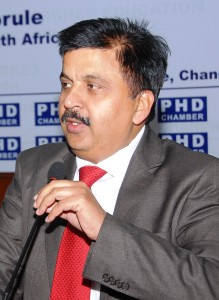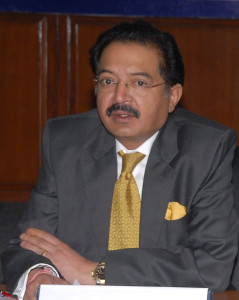PHD Chamber- Indo-Pak- Bilateral- Trade- ICP
ENHANCED ECONOMIC ACTIVITY TO USHER IN INTEGRATED DEVELOPMENT
WAREHOUSING INFRASTRUCTURE, COLD CHAIN FACILITIES, TRANSPORTATION DEMANDS TO INCREASE
LEAD TO GENERATION OF EMPLOYMENT ESPECIALLY IN SERVICES SECTOR
Amritsar, 30 November, 2014
Indicating that Wagah-Attari land route, being the shortest and cheapest route, through which if all the 7500 items instead of the present 137 only are allowed, the Indo-Pak trade volumes shall grow manifold, leading to an enhanced economic activity along the border, said Rajiv Bali, Chairman, Punjab Committee, PHD Chamber of Commerce and Industry.
Indicating that economic development will follow from a greater market access, Bali said, “The influx of imports through this route shall bring in investments to the region, leading to integrated development on the lines of other freight corridors.”
Asserting that Governments on both sides would benefit from trade tariffs that could possibly be used to improvise infrastructure to facilitate greater formal trade, which currently is being lost to illegal trade, Bali said, “Increased formal trade would lead to the development of Warehousing Infrastructure, Cold Chains facilities, increase in transportation demands besides culminating into a chain reaction effect leading to generation of employment, especially in the services sector.”
Moreover, it would lead to a stabilisation of prices due to greater supplies. Besides this, thousands of workers, entrepreneurs, and companies would reap the benefits of trade, he added.
Sharing that Indo-Pak trade through Wagah land route in Amritsar has witnessed significant increase in the recent past through the Integrated Check Post (ICP) at the Wagah border, which was inaugurated in April, 2012 to facilitate the trade, Dalip Sharma, Director, PHD Chamber of Commerce and Industry said, “As per an estimate, the opening up of the ICP at Wagah- Attari border shall increase the bilateral trade to $8 billion dollars a year in the next two years from the current level of $2.6 billion”, sharing that estimated overall bilateral trade between India and Pakistan stood at around 380 million dollars only in 2004.
Hitherto, a greater proportion of trade occurs through smuggling or third countries like Dubai estimated at $250m to $3 billion. One estimate pegs trade via the Mumbai-Dubai-Karachi route at 88% of the total informal trade, and the remainder, as cross-border informal trade through the Amritsar-Lahore and Rajasthan-Sind border routes.
Currently, the top five products imported by India from Pakistan are edible fruits & nuts, mineral fuels, raw cotton and denim, organic chemicals and plastics like unsaturated hydrocarbons, polyvinyl chloride etc.
Indian exports to Pakistan include processed cotton, prepared animal fodder, edible vegetables, plastics and organic chemicals like polypropylene, xylene, polyethylene etc.
“We at PHD Chamber are quite optimistic that consistent efforts to boost bilateral trade may see future collaboration in allowing mutual transit rights to each other. India could gain rights to access Afghanistan through Pakistan.”
Sharma revealed that PHD Chamber has been closely working with different Industry Chambers of Pakistan and holding talks for developing harmonious relations and inviting them to interact with the Indian Industry Associations and organising exclusive Indo-Pak trade shows at Ludhiana, Shimla etc. We vow to continue with our efforts for harmonious relations in the future as well. PHD-PITEX, the international trade show being organized annually at Amritsar witnesses major Pak participation, having a dedicated pavilion of Pakistan.
“Back to back visits by Indian delegation to Pakistan and vice versa would help in pushing trade talks to the next level”.
The frequent exchange of delegations and ideas between the neighboring countries, said Sharma, would not only help develop relations but also usher in an era of development & growth.


